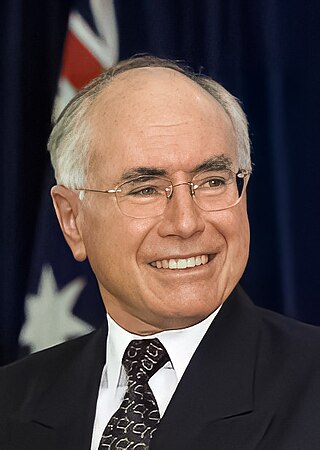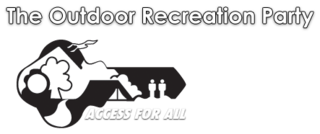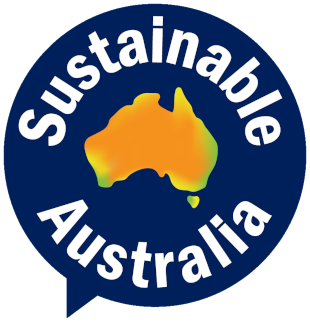Related Research Articles

The Democratic Labor Party (DLP) was an Australian political party. The party came into existence following the 1955 ALP split as the Australian Labor Party (Anti-Communist), and was renamed the Democratic Labor Party in 1957. In 1962, the Queensland Labor Party, a breakaway party of the Queensland branch of the Australian Labor Party, became the Queensland branch of the DLP.

The 2004 Australian federal election was held in Australia on 9 October 2004. All 150 seats in the House of Representatives and 40 seats in the 76-member Senate were up for election. The incumbent Liberal Party of Australia led by Prime Minister of Australia John Howard and coalition partner the National Party of Australia led by John Anderson defeated the opposition Australian Labor Party led by Mark Latham.

The Shooters, Fishers and Farmers Party (SFF) is a conservative Australian political party. It primarily advocates for increased funding and services for rural and regional Australia, protecting the right to farm, enhancing commercial and recreational fishing, tougher sentencing for illegal firearm trade and usage, and relaxing gun control for law abiding citizens.

The Unity Party was a small multiculturist party in Australia, formed in 1997 and primarily active in the state of New South Wales. It was formed with the aim of opposing the rise of the controversial anti-immigration politician Pauline Hanson. Although initially billed as a party to unite Australians of all ethnicities against racism, Unity failed to draw significant support outside Australia's East Asian ethnic communities. After the demise of Pauline Hanson as a political force, Unity shifted focus onto ethnic community affairs at a local government level.
The Fishing Party (TFP) was a minor Australian political party whose primary support base is found among recreational fishers. The party was founded by Robert Smith in July 2000 and it had branches in several Australian states. It was headquartered in Singleton, New South Wales (NSW).

The Outdoor Recreation Party (ORP) was a minor political party originating in New South Wales (NSW), Australia. It professed to represent the outdoor community and interests such as cycling, bushwalking, camping, kayaking, 4WD motoring, skiing, fishing and shooting. It was formally allied with the Liberal Democratic Party.
The Douglas Credit Party was an Australian political party based on the Social Credit theory of monetary reform, first set out by Clifford Douglas. It gained its strongest result in Queensland in 1935, when it gained 7.02% of first preferences under the leadership of the psychiatrist Dr Julius Streeter. Streeter had returned to Australia in 1919 as a war hero after being a surgeon in the Battle of Ypres where he was injured by mustard gas.
Legalise Cannabis Australia (LCA), also known as the Legalise Cannabis Party (LCP) and formerly the Help End Marijuana Prohibition (HEMP) Party, is a registered single-issue Australian political party. It has a number of policies that centre around the re-legalisation and regulation of cannabis for personal, medicinal and industrial uses in Australia.

The 1990 Australian federal election was held in Australia on 24 March 1990. All 148 seats in the House of Representatives and 40 seats in the 76-member Senate were up for election. The incumbent Australian Labor Party, led by Bob Hawke, defeated the opposition Liberal Party of Australia, led by Andrew Peacock, with its coalition partner, the National Party of Australia, led by Charles Blunt, despite losing the nationwide popular and two-party-preferred vote. The result saw the re-election of the Hawke government for a fourth successive term.

The Libertarian Party (LP), formerly known as the Liberal Democratic Party (LDP), is an Australian political party founded in Canberra in 2001. The party espouses smaller government and supports policies that are based on classical liberal, libertarian principles, such as lower taxes, opposing restrictions on civil liberties, decentralisation, uranium mining, and the relaxation of smoking laws.

The Non-Custodial Parents Party was a minor political party in Australia registered between 1999 and 2020. It supported less government control of many aspects of daily family life, focusing on reform of family law and child support.
The No Goods and Services Tax Party, previously the Abolish Child Support and Family Court Party, was a minor Australian political party registered between 1997 and 2006 which fielded candidates between the 1998 and 2004 federal elections. The change of name in 2001 was largely a response to the Howard Government's implementation of the Goods and Services Tax. It polled low totals. One Nation founder David Ettridge contested the Senate in Queensland in 2001 for the party.
The Advance Australia Party, formerly the Building Australia Party, was a minor political party in Australia, advocating the rights of the building industry. First registered in New South Wales, it achieved federal registration in June 2010, but was deregistered in May 2015. However, the party was still active for several years afterwards on a state level, sending out candidates for the New South Wales Hills Shire Council and Mayoral elections in 2017. The Advance Australia Party was deregistered on 13 August 2019.

The Sustainable Australia Party is an Australian political party that was formed in 2010.
The Voluntary Euthanasia Party (VEP) was a minor political party in Australia, founded in early 2013 by Corey McCann to advocate for legislative change to allow voluntary euthanasia in Australia. The party's inception was strongly supported by Dr Philip Nitschke, director of Exit International and Richard Mills, then President of Dying with Dignity NSW.

The Health Australia Party (HAP) was a political party in Australia, founded in 2013 as the Natural Medicine Party. It adopted its current name in 2015.

The Australian Cyclists Party was a minor political party in Australia. It was registered with the New South Wales Electoral Commission in 2014, and unsuccessfully contested the 2015 New South Wales state election. It was also registered later with the Victorian Electoral Commission, and unsuccessfully contested the 2014 Victorian state election. It registered with the Australian Electoral Commission for federal elections on 20 August 2014 and voluntarily deregistered on 5 September 2017.

The Arts Party is an Australian political party inspired by the importance of the arts and creative action. The party was voluntarily deregistered with the Australian Electoral Commission on 25 June 2019, but remains registered for local elections with the New South Wales Electoral Commission.

The Australian Federation Party (AFP), also known as AusFeds and formerly known as the Country Alliance and the Australian Country Party, is an Australian political party. Founded in 2004 by four rural Victorians, the party lodged its initial registration with the Victorian Electoral Commission on 15 August 2005.
References
- 1 2 3 4 Protestant People's Party of Australia., "Policy of the Protestant People's Party of Australia: Protestantism Is Patriotism.", Sydney, New South Wales: Protestant People's Party, nla.obj-286682024, retrieved 12 October 2022– via Trove